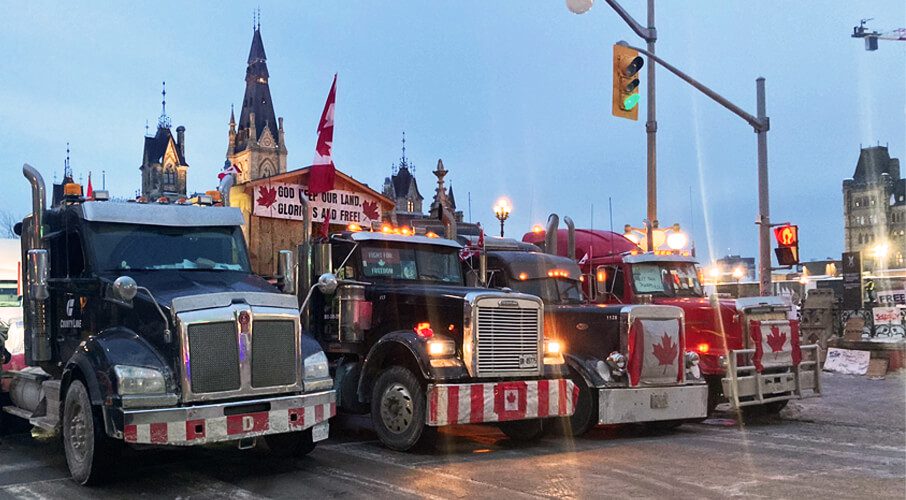 Much ink has been spilled about growing political polarization and the threat it presents to liberal democracies, including Canada, writes Aaron Wudrick. This past weekend in Ottawa will be remembered as both a symptom and cause of this phenomenon.
Much ink has been spilled about growing political polarization and the threat it presents to liberal democracies, including Canada, writes Aaron Wudrick. This past weekend in Ottawa will be remembered as both a symptom and cause of this phenomenon.
By Aaron Wudrick, February 3, 2022
Did you hear about the big protest in Ottawa that started this past weekend? According to media reports, a convoy of trucks driven by white supremacists and conspiracy theorists have caused chaos in downtown Ottawa, parking vehicles at the National War Memorial, desecrating a Terry Fox statute, and demanding food from local soup kitchens while snarling traffic and annoying local residents.
At least, that’s what most of the news coverage of the protest seems to emphasize. It is true, there are ugly parts of the story, and it has been important to highlight them clearly and confront them honestly.
But you’d have to make it past those unflattering details to discover that more than 10,000 people from coast to coast have descended on the nation’s capital for the purpose of peacefully protesting, according to the official organizer, “rules and mandates that are destroying the foundation of our businesses, industries and livelihoods.” Those words, incidentally, are lifted from the GoFundMe page for the Freedom Convoy 2022, which as of this writing has raised over $9 million in a matter of weeks, showing a level of broad support that is impossible to simply brush away.
To be clear: it’s absolutely fair game, and indeed a vital public service, for the media to identify the bad characters at a protest, and there is simply no defending the actions of those who, for example, wave around Nazi flags, shout violent threats, or defile national monuments.
The problem is that the effort which our fourth estate expends in fingering these miscreants and the degree to which they are presented as being representative of an entire movement seem to vary wildly depending on what is being protested. Indeed, it was only last year that dozens of Canadian churches were being vandalized, some burnt to the ground, yet comparatively greater outrage has been given to the fools who festooned a statue of Terry Fox with flags and political signs. Some protests, despite violence, looting, and arson, are described as peaceful and justified; the larger aims of the protestors are emphasized, and the individual bad actors are deemphasized.
In any case, it’s quite clear that many people, including more than a few politicians, are all too happy to impugn by association the entirety of the protest – and not just everyone in attendance, but anyone who supports the general pushback against what they see as excessive pandemic restrictions – as being party to some kind of far-right plot.
This narrative may seem to fit when looking only at the worst actors who latched onto the convoy. But a more comprehensive view presents a different story.
The protest consists of thousands of predominantly working-class Canadians who are understandably desperate for life to return to normal. These blue-collar workers, whose lives have been more disrupted than most, are angry that Canada has been almost uniquely reliant on harsh and long-term COVID restrictions when compared to peer nations.
What may very well have been the largest convoy of trucks in world history travelled to the nation’s capital to protest in subarctic temperatures to protect the freedom of friends and colleagues to earn their livelihoods. While the motives varied, their primary demand was the repeal of a vaccine mandate for cross-border truckers whose primary purpose is not the protection of public health, but to generate quick political dividends for the governing party.
In this context, it is hard to think of anything more nauseating than watching white- collar elites, who have spent the duration of the pandemic working comfortably behind their computers, take to social media to sneer at thousands of justifiably angry working-class Canadians.
Demanding the end of a specific vaccine mandate can in no way be characterized as “anti-vax.” Equating opposition to vaccine mandates with being against vaccines generally is an obvious conflation of two very different things, made all the more obvious by the fact opposition to vaccine mandates includes vast numbers of fully vaccinated individuals.
Why would vaccinated individuals oppose vaccine mandates? Because their objection is not to vaccines or their effectiveness, but to governments’ use of coercive and punitive measures to impose them upon the reluctant. This opposition is based on a principle that, prior to the pandemic, would have been so uncontroversial as to be trite: that the government should not pressure people to put things into their bodies against their will, and they should not ostracize and vilify them when they do not.
Much ink has been spilled about growing political polarization and the threat it presents to liberal democracies, including Canada. This past weekend in Ottawa will be remembered as both a symptom and cause of this phenomenon. It is a symptom because it happened in the first place: it is undeniable proof that a sizeable constituency of regular Canadians feels so unheard by and disconnected from our institutions that they must resort to such tactics.
But it is also a cause because the “debate” it has spawned has only served to reinforce the sad fact that we seem to have lost the ability to have reasonable disagreements, and has instead exacerbated the distance and amplified the bad faith between those with different views. And these are feelings that will linger long after the pandemic is behind us.
Aaron Wudrick is the Director of MLI’s Domestic Policy Program.





